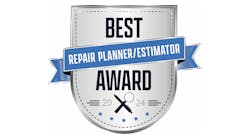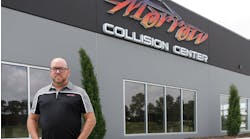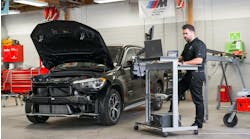Paul Barry may be new to the role of executive director for CIECA (Collision Industry Electronic Commerce Association), but his longstanding relationship with the association made him a natural fit. Having begun his role on June 1 — amid a global health pandemic and the onslaught of continuing technology advancements across the industry — Barry recognizes the challenges the association faces. But he’s ready to meet them head-on. He sat down with ABRN to discuss the COVID impact, CIECA’s overall goals and how they are meeting industry challenges and encouraging partnerships.
What do you see as some of the greatest challenges CIECA faces in light of the COVID-19 pandemic?
COVID has certainly created issues for the entire industry. It has also impacted CIECA and our members in some ways. Not so much from an operational perspective. CIECA is and always has been a fairly virtual organization with staff and board members located across the country. We have used phone and web-based meeting technology for years to develop data integration standards, so from an operational standpoint, COVID has not really been a challenge.
I think the biggest impact for CIECA is the inability to travel, network with a cross-section of the industry and have face-to-face meetings. CIECA has become a forum for the industry to meet and discuss technology topics and challenges. Often, it is the informal or casual conversation after the meeting where relationships are built and ideas are generated. It is the inability to have face-to-face meetings and network that we all really miss.
What are your goals for CIECA in your first 12 months as executive director?
This is an interesting time for CIECA. I am new to the organization, having just started a few months ago. In addition, long-time CIECA staff member Charley Quirt recently retired, so we have another new face, Paulette Reed, who recently joined us to replace Charley. With new players involved, it’s a good time to take a fresh look at where CIECA has been, what’s happening in the industry and where we should go in the future.
My first order of business is getting up to speed on the day-to-day operations of running CIECA. I am talking to our board and other members of the industry, trying to understand where they see the industry going and getting input on how CIECA needs to prepare for the future. With all that, we are taking a fresh look at our strategic plans for 2021 and beyond. My goal is to ensure that we have a solid plan for the next year that will position CIECA to provide the most benefit to our members and the industry.
I am doing a lot of work on our internal operations, looking to improve our processes and membership services. We also want to continue the mission to grow CIECA and attract new entrants as well as established companies that may not yet know all the benefits of CIECA membership.
Are there new partnership or directions you are looking to develop with CIECA over the next five years?
There are really two key areas we are focusing on for the foreseeable future:
-
OEMs: Manufacturers are taking a much more active role in defining collision repair procedures. This is having a big impact on the industry. The electrification of vehicles, the rapid evolution of electronic sensors and autonomous driving features are making the repair process significantly more complex. We need to build stronger relationships with the OEMs and get them involved in setting standards so that we can help the industry adapt to these changes quickly and efficiently. We simply can’t do that without the OEMs involvement.
- Insurtechs: The proliferation of new insurance technology (Insurtech) companies has been booming for years and does not appear to be slowing down. The Insurtech companies that are developing products for the collision space should all be aware of and be part of CIECA. We can help them significantly in terms of building integrations and market adoption and it is in everyone’s best interest if new players in the market can leverage technology standards that are already in place rather than introducing proprietary means of integration.
How has your past experience prepared you for this role?
I have more than 35 years of experience in various aspects of the collision repair industry. I have held executive-level positions at both a software company and multiple insurance companies. Through these experiences, I have learned firsthand the challenges faced by insurance companies trying to communicate efficiently with thousands of body shops and the challenges faced by shops trying to communicate with dozens of insurance companies.
I have worked on a number of projects over the years, often focused on integration with partners in the supply chain including claims assignment, estimate and photo upload, paint & materials ordering, estimatics and repair analytics.
I have been involved with CIECA for more than 20 years and served on the CIECA Board of Trustees for about seven years. I was also on the CIECA Executive Committee, holding the positions of secretary, treasurer and vice-chair, so I have a long-term relationship with CIECA and the many great people who are part of the organization.
I feel that all of these experiences have given me a greater appreciation for what CIECA does and how I can help it continue to be successful in the future.
Like many other events, the CIECA CONNEX conference had to be cancelled this year. What can CIECA members do to stay connected until events are given a green light again?
We were certainly all disappointed that we had to cancel the CONNEX Conference this year due to COVID. CONNEX is our biggest event each year and provides the industry with an opportunity for both business and technical people to get together and share views and perspective on issues facing the industry. It has grown over the years and is now an event that many people look forward to.
We hope very much to hold the CONNEX conference in September 2021 and plan to host it in Charlotte, NC. We will be sharing more about registration as the time gets closer.
The other great industry outreach that we offer is our monthly CIECAST webinar series. These are one-hour presentations where we invite experts from the industry to talk about topics that are timely and relevant. Each month, hundreds of people from all segments of the industry register to attend our CIECAST events. You do not need to be a CIECA member to attend and there is no cost. Simply go to www.cieca.com and register under the CIECASTS tab.
Technology continues to grow and advance across all facets of the automotive industry. How has this shined a light on some of CIECA’s core focuses?
As an industry, we see a lot of change coming at us in the not-to-distant future. This includes the growing development of the electric vehicle, the rapid evolution of autonomous and Advanced Driver Assistance Systems (ADAS) technologies, battery technology and the environmental impacts it is creating, smart roads and smart cities, the internet of things (IoT) and connected cars. These developments will all result in some kind of changes in the repair process. Whether it is the processes of the supply chain, repair techniques or the parts we use, there will ultimately be changes in the future. CIECA can respond to these changes by amending our current standards or developing new ones as needs dictate.
We also want to stay up to date in terms of standards technology. Our current data standards were developed for XML. Companies today are moving to APIs, many using the JSON format because it is more efficient. We are exploring how to support the needs of both XML and JSON standards for the future.
Are there any areas where CIECA is looking for more industry involvement and participation?
CIECA was founded to support all aspects of the collision industry. Our goal is to help the industry operate more efficiently in support of our members and, ultimately, the consumer.
CIECA is principally a volunteer-based organization. All of our standards committees are comprised of volunteers from different companies within the industry. It is not unusual to have people from software companies, insurance companies, recyclers, salvage companies, parts companies and others working together to develop and refine the CIECA Standards.
We are always open and welcoming to new volunteers. You don’t have to be part of a CIECA member company to participate. We invite anyone interested in learning more about CIECA or joining a CIECA committee to reach out to us. We will be happy to invite you to a meeting, give you an opportunity to learn about our various committees and introduce you to committee members.
For more information, email [email protected] or visit www.cieca.com.



